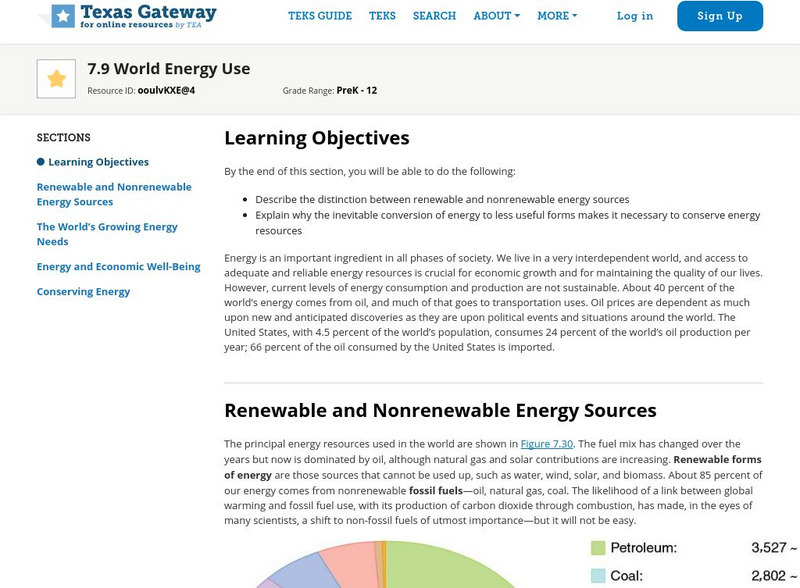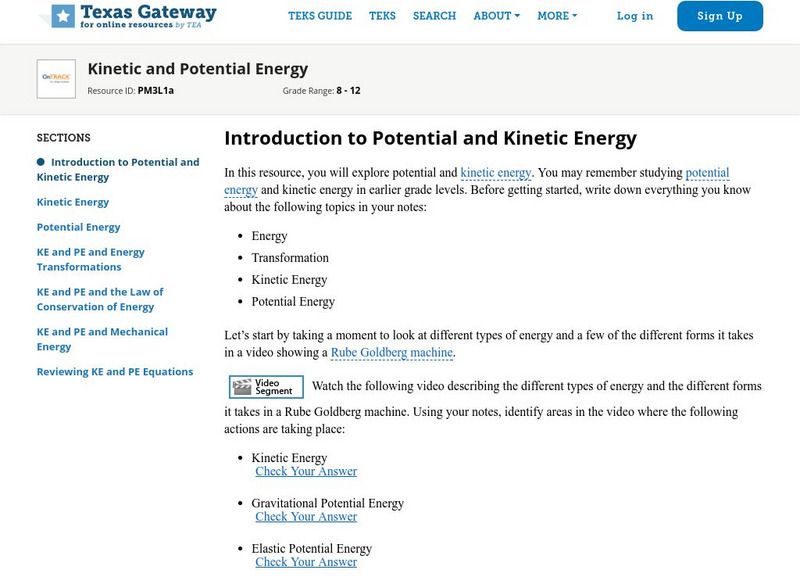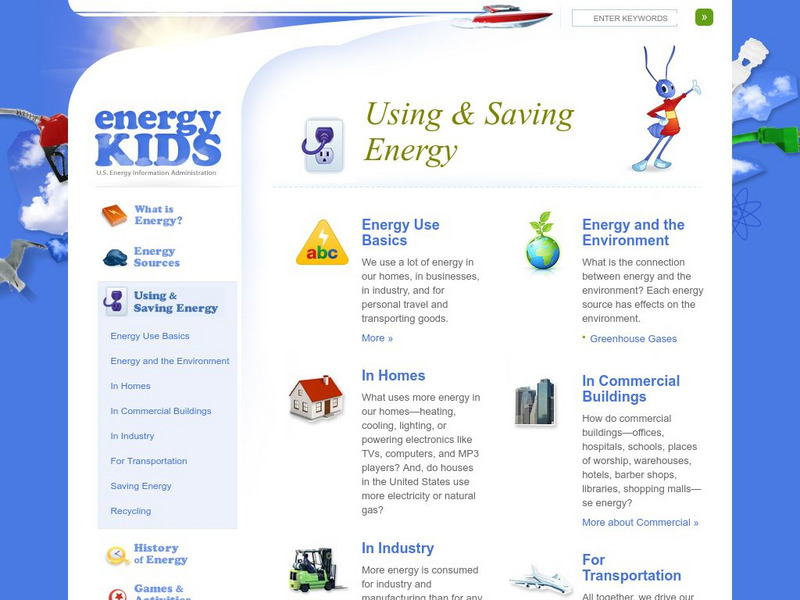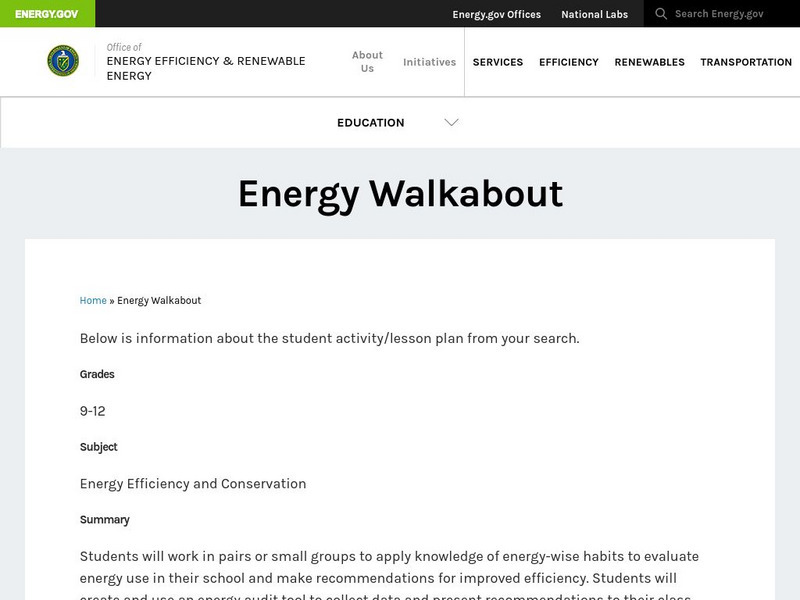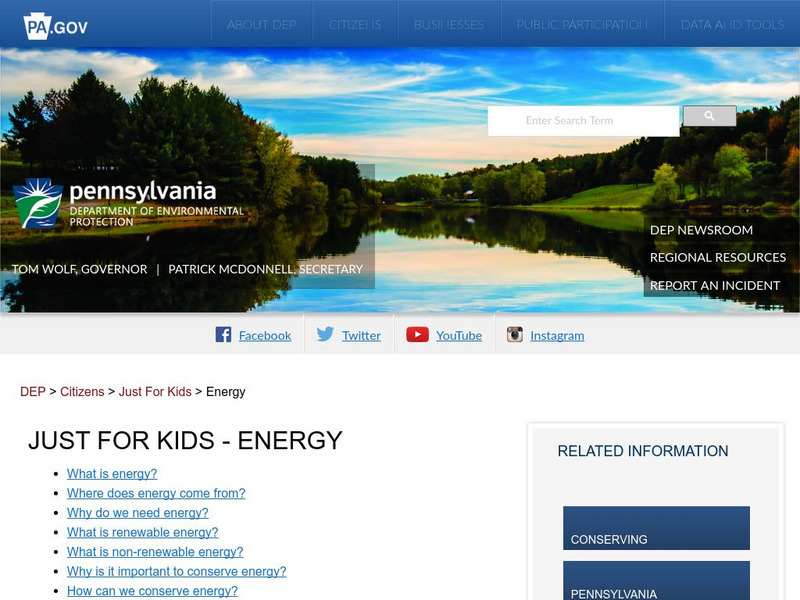New York University
New York University: Law of Conservation of Energy
Site presents a straightforward presentation of Rutherford's work concerning the Law of Energy Conservation. Provides an adequate summary of early science on the nucleus, and includes much needed illustrations.
Other
American Coal Foundation: Lesson Plan: Conserving Electric Energy
Lesson plan focuses on electricity use and energy consumption, while engaging students in a hands-on activity that helps them comprehend the effects of regulation and conserving energy resources.
TeachEngineering
Teach Engineering: Energy of Motion
By taking a look at the energy of motion all around us, students learn about the types of energy and their characteristics. They first learn about the two simplest forms of mechanical energy: kinetic and potential energy, as illustrated...
Concord Consortium
Concord Consortium: Stem Resources: Atoms and Energy
Online activity walks learner through exploration of kinetic and potential energy using animations. Through graphs, a quantitative connection is made between the movement and the energy involved. This information is then related to the...
Texas Education Agency
Texas Gateway: Ap Physics: Conservative Forces and Potential Energy
By the end of this section, you will be able to define conservative force, potential energy, and mechanical energy; explain the potential energy of a spring in terms of its compression when Hooke's law applies; and use the work-energy...
Texas Education Agency
Texas Gateway: Rotational Kinetic Energy: Work and Energy Revisited
By the end of this section, you will be able to derive the equation for rotational work, calculate rotational kinetic energy, and demonstrate the law of conservation of energy.
University of Colorado
University of Colorado: Ph Et Interactive Simulations: Energy Skate Park: Basics
An interactive skate park simulation that teaches about conservation of energy, kinetic energy, potential energy, thermal energy, and friction. This simulation can either be downloaded or played online and includes handouts, lesson...
Texas Education Agency
Texas Gateway: Ap Physics: World Energy Use
By the end of this section, you will be able to describe the distinction between renewable and nonrenewable energy sources and to explain why the inevitable conversion of energy to less useful forms makes it necessary to conserve energy...
University of Colorado
University of Colorado: Ph Et Interactive Simulations: Energy Skate Park
Learn about conservation of energy with a skater dude. Build tracks, ramps, and jumps for the skater and view the kinetic energy, potential energy and friction as he moves.
Other
Bc Open Textbooks: Energy and the Simple Harmonic Oscillator
This resource examines how to determine the maximum speed of an oscillating system. It discusses how the concept of law of energy can be applied in solving these types of problems.
OpenStax
Open Stax: Potential Energy and Conservative Forces
In the following interactive students will define conservative force, potential energy, and mechanical energy. They will explain the potential energy of a spring in terms of its compression when Hooke's Law applies. Students will also...
Encyclopedia of Earth
Encyclopedia of Earth: Energy
A collection of articles on energy-related topics, including fossil fuels, conservation, alternative energy, and environmental issues.
Other
Lehigh University: Energy
An inquiry-based science unit for middle school students centered on the world's energy sources. The lessons integrate technology and lab activities while teaching about energy sources, production, and consumption.
University of Colorado
University of Colorado: Ph Et Interactive Simulations: Energy Skate Park
Build tracks, ramps and jumps in a skate park to learn about energy.
Nature Conservancy
The Nature Conservancy: Renewable Energy
In this lesson, students explore solar and wind power-two important renewable energy sources.
Texas Education Agency
Texas Gateway: Kinetic and Potential Energy
Given diagrams, illustrations or relevant data, students will identify examples of kinetic and potential energy and their transformations.
Science Buddies
Science Buddies: Paper Roller Coasters: Kinetic and Potential Energy
In this lesson plan, your students will learn about kinetic and potential energy as they build their own roller coasters from simple classroom materials.
CK-12 Foundation
Ck 12: Conservation of Mass and Energy in Nuclear Reactions
[Free Registration/Login may be required to access all resource tools.] Explores the conservation of mass and energy in nuclear reactions and Einstein's equation.
US Energy Information Administration
U.s. Eia Energy Kids: Saving Energy
A look at what you can do to save energy that answers "What can I do to save energy?" and "How can recycling save energy?" Also provides a collection of useful links to more information on energy efficiency, waste, and recycling.
US Department of Energy
United States Department of Energy: Energy Walkabout
In this activity, learners work in pairs or small groups to apply knowledge of energy-wise habits to evaluate energy use in their school and make recommendations for improved efficiency. Students create and use an energy audit tool to...
Annenberg Foundation
Annenberg Learner: The Habitable Planet: Energy Lab
Try and meet global energy demands by using alternative energy sources while keeping the carbon levels in the atmosphere down to acceptable levels. Simulator includes a data table available for download for student records.
Energy4Me
Energy4me: Energy Challenges
Read about the challenges of global energy use and consumption, and what solutions exist for today's engineers.
Physics Classroom
The Physics Classroom: Energy Conservation on an Incline
This site is a discussion and animation about whether the total mechanical energy of a cart rolling down an incline is conserved, which can be determined if there are any external forces acting upon it.
Other
Pennsylvania Department of Environmental Protection: Just for Kids: Energy
Where does energy come from? What are non-renewable energy sources? How can we conserve energy? Learn the answers to these questions and more.








